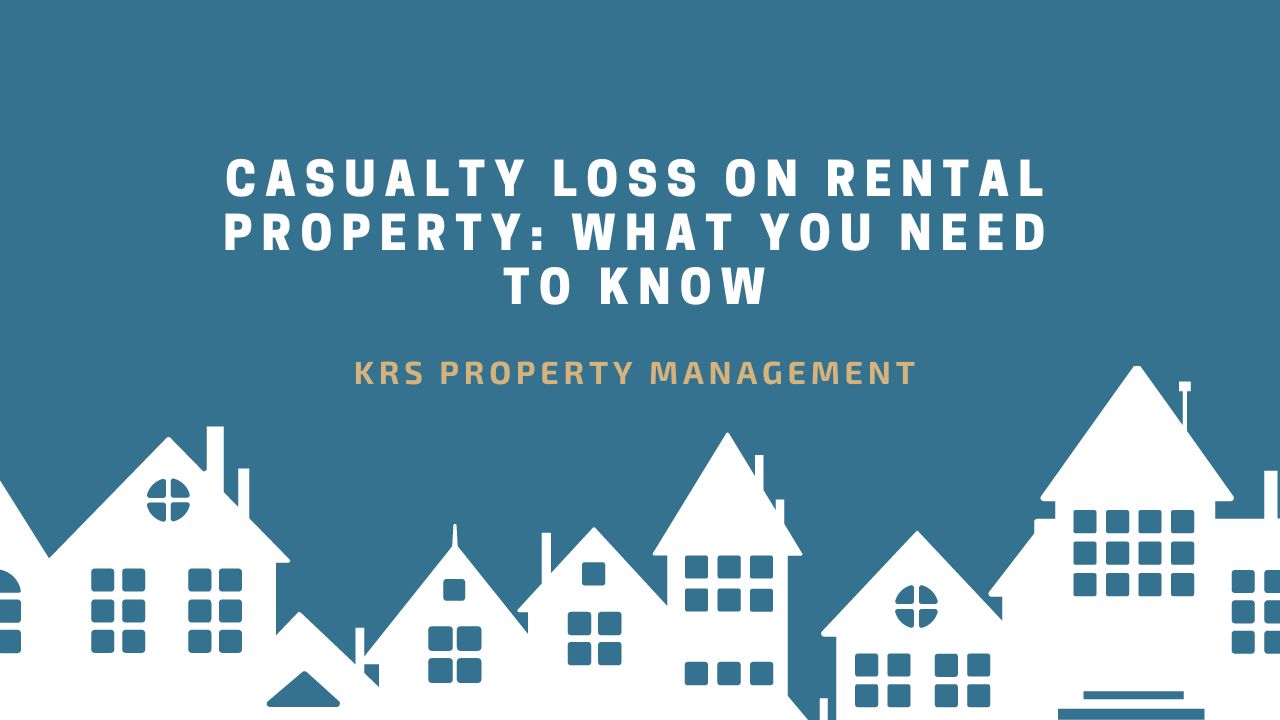
As a landlord, it's crucial to be well-informed about the financial aspects of managing rental properties, mainly when unexpected events occur. One such aspect is understanding how casualty loss can impact rental property taxes.
In this blog post, we'll share the intricacies of casualty loss, its tax implications, and how insurance plays a role. Understanding these factors can save you a significant amount of money and ensure the successful operation of your rental business.
What Is a Casualty?
A casualty refers to damage, destruction, or loss of property resulting from sudden, unexpected, or unusual events. Unlike gradual wear and tear, which is not deductible, casualty losses occur abruptly and without warning. Examples of deducible casualties include:
- Floods - Damage from heavy rainfall, hurricanes, or overflowing rivers can devastate homes and infrastructure.
- Fires - Uncontrolled fires, whether wildfires or residential fires lead to significant property destruction.
- Earthquakes - Seismic activities that result in violent shaking of the ground cause structural damage to buildings, roads, and bridges.
- Government-Ordered Demolitions - Situations where the government mandates the demolition of properties, usually for public safety reasons, urban redevelopment, or infrastructure projects, resulting in displacement and property loss for owners.
- Vandalism - Acts of malicious destruction or alteration of property by others, including graffiti, breaking windows, or damaging vehicles.

Non-Deductible Events
Non-deductible events include progressive wear and tear, such as gradual roof decay or erosion. These are considered maintenance issues rather than sudden casualties. When considering casualty loss deductions, several expenses related to the rental property can be accounted for including:
- Mortgage Interest Payments - Interest paid on your mortgage for rental properties can be deductible, especially if the property suffers a casualty event.
- Rental Real Property Depreciation - Rental property depreciation is a deductible expense, which can be crucial when calculating casualty loss.
- Personal Property - Items like appliances and furniture within the rental property can also qualify for casualty loss deductions.
- Travel Expenses Related to Rental Activities - Travel expenses incurred while managing repairs or overseeing property maintenance due to casualty events are deductible.
- Home Office Expenses - Relevant expenses can be deductible if you use part of your home to manage rental properties.
- Repairs - Costs for repairing and renovating damages due to casualties are deductible. This includes leaks, gutters, floors, windows, and painting.
- Employees and Independent Contractors - Payments made to employees or contractors for repairs and maintenance due to casualty events qualify for deductions.
- Legal and Professional Services - Fees paid for legal or professional services related to resolving casualty loss issues can be deducted.
- Insurance Premiums - Insurance premiums for your rental property are deductible, which can be beneficial when dealing with casualty losses.

Casualty Loss Deduction: How Much Can You Deduct?
The deduction for casualty losses depends on various factors, such as the extent of the damage and available insurance coverage. Factors that impact the deduction amount include:
- Severity of Damage: The extent of the damage to the property.
- Insurance Coverage: The amount reimbursed by insurance.
Calculating Deductions for Casualty Loss
When calculating deductions consider:
Total Loss
When your rental property suffers a total loss, calculating your deductible casualty loss is relatively straightforward. Follow this formula:
Adjusted Basis - Salvage Value - Insurance Proceeds = Total Loss
Partial Loss
In cases where only part of the property is damaged, the calculation is a bit more complex. Here, you need to determine the lesser of the adjusted basis or the decrease in the property's fair market value (FMV). Use the following formula:
Lesser of Adjusted Basis or Decrease in FMV - Insurance Proceeds - Salvage Value = Partial Loss
Determining Fair Market Value
One of the vital components in calculating partial loss is determining the decrease in fair market value (FMV). The IRS allows landlords to use repair costs as a proxy to estimate the decrease in FMV, providing a more accurate reflection of the actual loss incurred.
Can Insurance Affect Tax Deductions for Casualty Losses?
Yes, insurance proceeds can significantly affect the amount you can deduct. Consider the following:

- Impact of Insurance Proceeds: The total amount received from insurance will reduce the deductible.
- No Requirement to File an Insurance Claim: You do not need to file a claim to qualify for the deduction.
- Procedure for Insufficient Insurance Compensation: If insurance compensation is less than expected, you can still claim the deductible amount based on the actual loss incurred.
- Other Factors That May Affect Tax Deduction for Casualty Losses
- Several other factors can influence the final deductible amount:
- Repairs Covered by Tenants: Any repairs covered by tenants reduce your deductible loss.
- Forgiven Federal Disaster Loans: These can affect the deductible amount.
- Free Repair Services by Relief Agencies: Agency contributions may decrease your claimable loss.
- Court Awards for Damages: Court-mandated compensations also impact the deductible amount.
Casualty Losses in Disaster Areas
If your rental property is in a federally declared disaster area, there are specific provisions for claiming casualty losses including:
- Deducting Losses in Federally Declared Disaster Areas: Special rules apply that may offer additional tax relief.
- Claiming a Disaster Loss Against Previous Year's Income: You may deduct the loss on the return for the year before the disaster occurred.
- Filing an Amended Return: This must be done within six months to take advantage of this provision.
Final Thoughts
Understanding casualty loss deductions is vital for any landlord looking to secure their investment and maintain profitability. You can confidently navigate these challenging situations by knowing what qualifies as a deductible casualty, how to calculate your losses and the impact of insurance and other factors.
If you're a landlord in the Richmond area looking for expert property management and guidance on handling casualty losses, contact KRS Holdings for comprehensive support. Our team is here to help you maximize your investments and ensure your rental business thrives.






